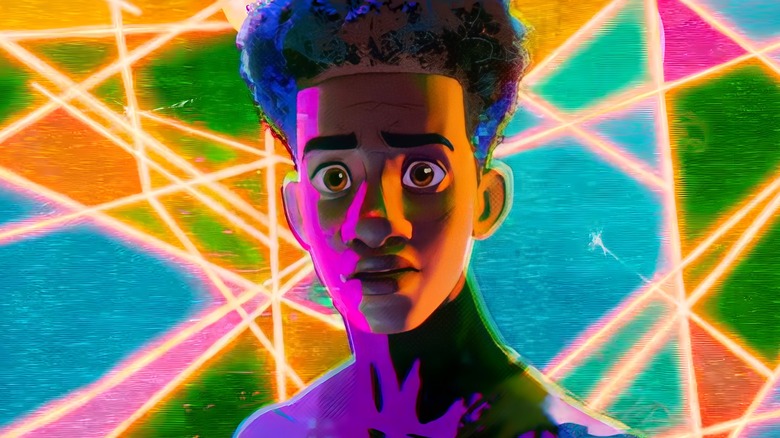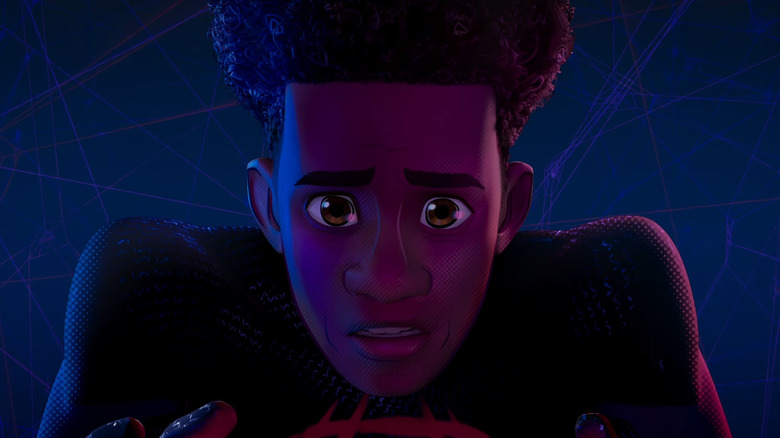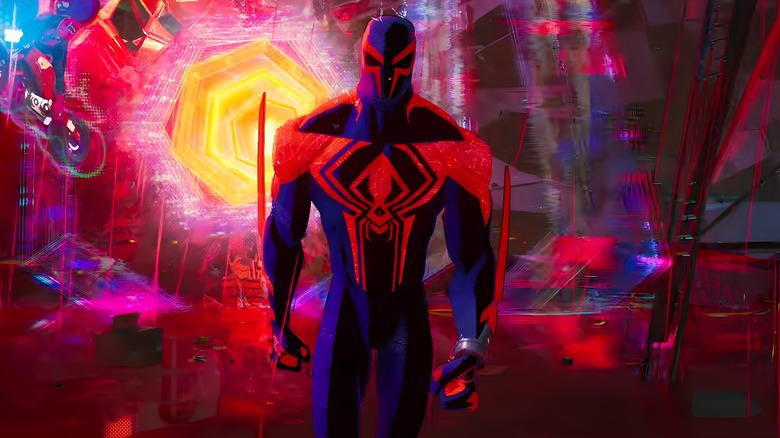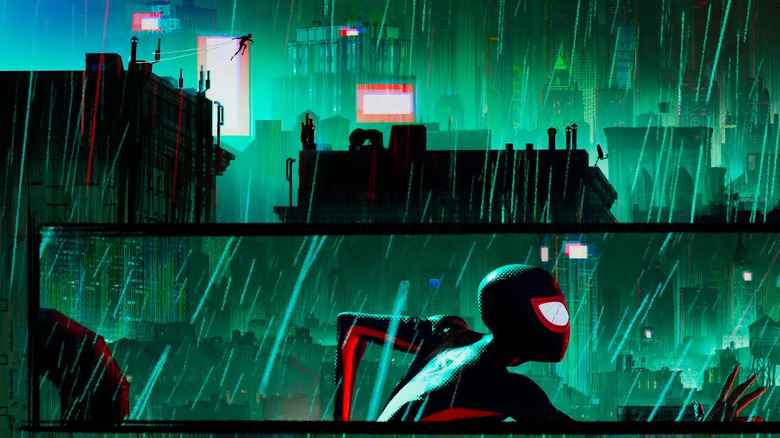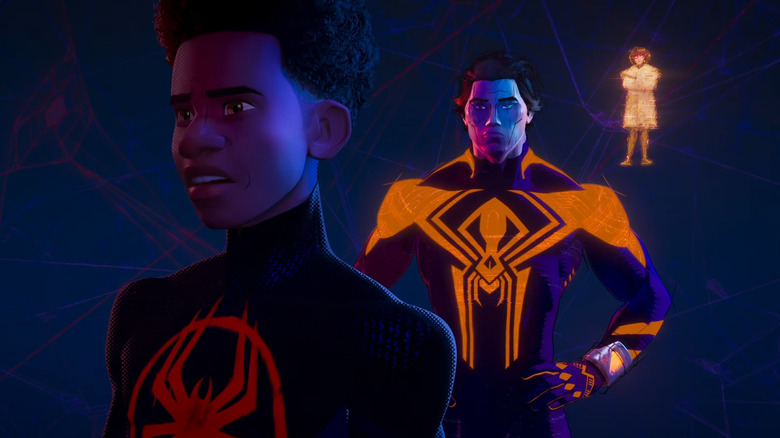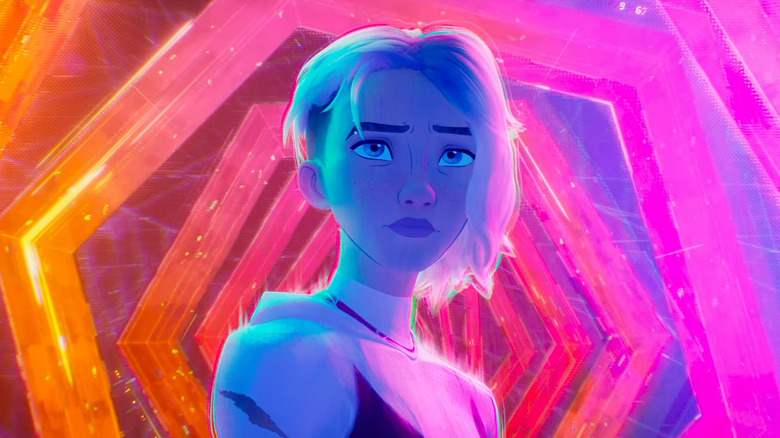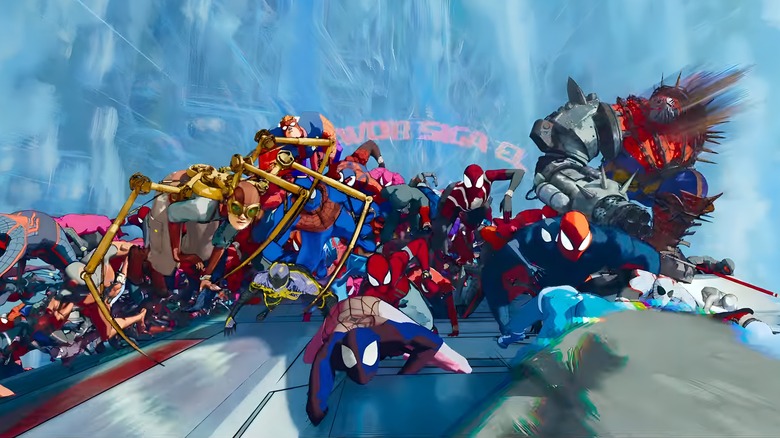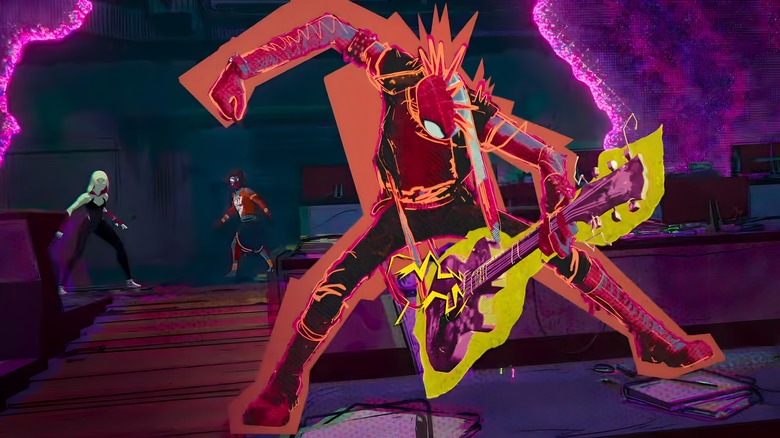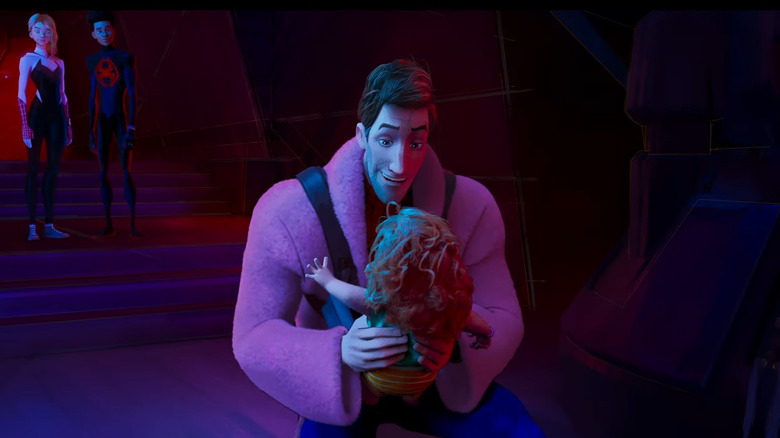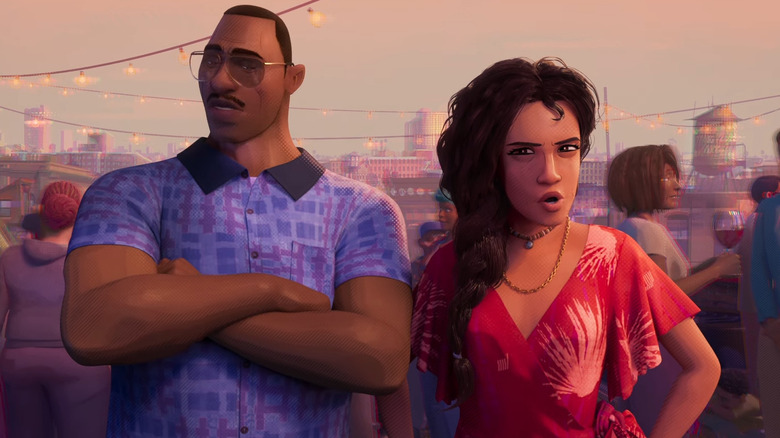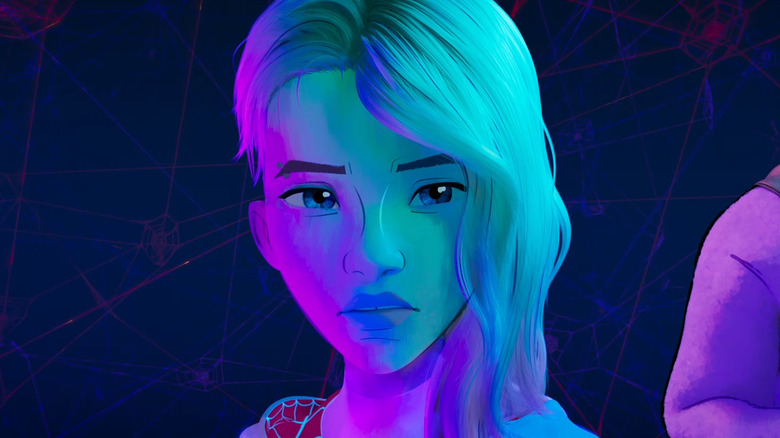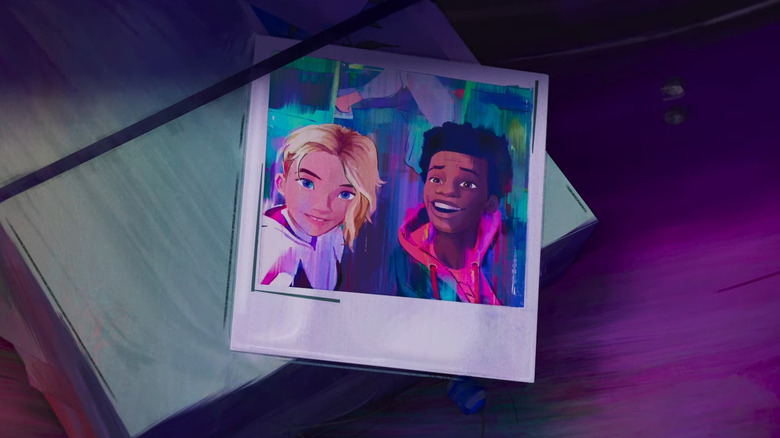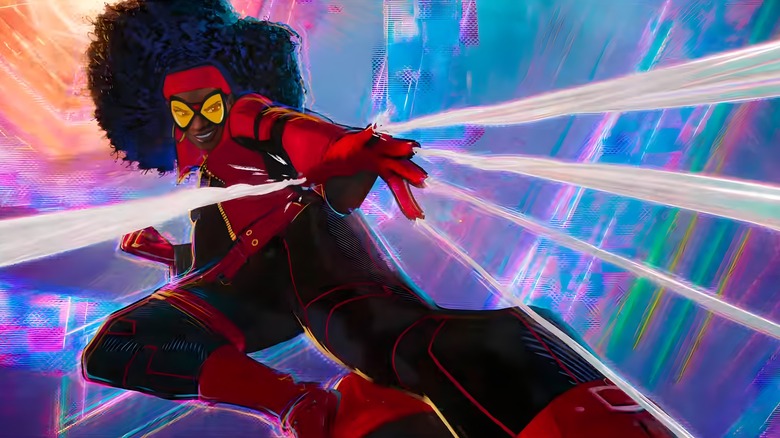The Ending Of Spider-Man: Across The Spider-Verse Explained
Much has changed in the world of superhero cinema since Miles Morales (Shameik Moore) burst onto movie screens in 2018's "Spider-Man: Into the Spider-Verse." The Marvel Cinematic Universe wrapped up its "Infinity Saga," and absent any original ideas, it began aping Sony's acclaimed animated adventure with its own multiverse. Then there's "The Flash," which aims to rewrite the big-screen DC canon, and "Everything Everywhere All at Once," which, while not a superhero movie, achieved huge success playing in the same transdimensional space.
Suffice it to say, multiverse movies have become the thing since "Into the Spider-Verse" premiered, which leaves its sequel, "Spider-Man: Across the Spider-Verse," in an interesting place. Many of the film's core plot beats echo comic book adaptations that have come out in the interim. However, "Across the Spider-Verse" keeps things fresh with its own unique brand of style and storytelling. While the animation once again takes center stage here (seriously, the movie looks staggeringly good), it also manages to distinguish itself emotionally from the bigger superhero franchises.
Like its predecessor, "Across the Spider-Verse" is a coming-of-age story. It's a movie about trying to find your place in the world, only to learn that you have to carve that out for yourself. And less expectedly, it ends on a doozy of a cliffhanger. So let's dive into the ending of "Spider-Man: Across the Spider-Verse," untangle the web, and look at where the series could be going next.
Miles Morales: The original anomaly
The first half of "Across the Spider-Verse" follows Miles and Gwen Stacy (Hailee Steinfeld) on parallel journeys. Both struggle to balance crime-fighting with their day-to-day lives and wind up feeling alone as a result. After Miles gets pulled into Gwen's new gig as a dimension-hopping timeline protector, however, things pick up speed. We meet Miguel O'Hara (Oscar Isaac), also known as Spider-Man 2099, and his "Spider-Society." We learn about their mission to protect "canon events" in the Spider-Verse — things like the death of an uncle, or of a police captain close to Spider-Man.
Miles wants no part of Miguel's tyrannical plan, so he runs. But as he does, he learns that his role in the web is much larger than just being one more friendly neighborhood Spider-Man. Miguel reveals that Miles is "the original anomaly" that first threw the Spider-Verse into disarray. Because the spider that gave Miles his powers wasn't from his dimension, but rather from Earth 42, the cosmic spider balance was thrown off. Ostensibly, this is what sparked all the multiverse chaos that we've seen in the films thus far.
That's why the Spot (Jason Schwartzman) is such a perfect villain or the film. Not only does he possess transdimensional powers, but he's also the scientist who brought over the spider that later bit Miles. The idea that his Spider-Man transformation caused more harm than good rattles Miles, but he refuses to give up on himself.
Miguel's crusade
Anomaly or not, Miles insists that Miguel's way of thinking is flawed. He disagrees with the idea that certain people have to die in order for the universe to be in balance. His 2099 counterpart insists that messing with the canon only brings destruction, even going so far as to say that Miles is the reason his universe's Peter Parker died. It's also implied that Earth 42 must have suffered after losing its intended Spider-Man — something that's shown clearly later in the film.
Enraged by Miles' disobedience, Miguel goes on a rampage, sending Spider-People out into every corner of the multiverse in search of him. His fervor is fueled by his own past mistakes, but it's hard not to see him as the villain. As he himself says, being Spider-Man is about sacrifice. It requires a level of tragedy. We see glimpses of Miguel's own tragic backstory and how he brought a whole dimension to its knees by trying to hide there in a happy life. Or at least, we see his version of the story.
But is it possible that he's wrong? Is it possible that there's more going on than just good deeds causing mayhem? Maybe he's right. Maybe Spider-Men can't find true solace or else the universe will collapse. But Miguel appears to be so lost in his own pain and torment that he's incapable of thinking clearly. So far, the "Spider-Verse" films have been about realizing that we can make our own paths. Perhaps Miguel can still learn that lesson somewhere down the line.
The wrong universe
After leading the Spider-Society on a wild goose chase away from their headquarters, Miles sneaks back into the base and uses the transdimensional portal tech to go home. He arrives in New York on a dreary, rainy night, and as he runs home, he's haunted by his doubts and fears. He hears Miguel's words in his head telling him that he's a mistake, but he just keeps running until he gets home.
There he finds his mother, Rio (Luna Lauren Vélez), to whom he finally confesses his identity as Spider-Man. All is not as it seems, though, as Rio has no idea who Spider-Man is, and Miles quickly discovers that Miguel's machine sent him back to his spider's universe, not to his. Now trapped in a dystopian world where his father (Brian Tyree Henry) died instead of his uncle, Miles desperately tries to conceive of a plan to get home.
The moment he realizes he's in the wrong universe is a powerful and unsettling moment. There's an uncanniness to his conversation with his mother that drives home just how out of place he actually is, even before the truth is fully revealed. Beforehand, Miles delivers a powerful monologue about how he's finally embraced what he's capable of. "I know how strong I am now," he says. He conquers the doubts and fears that were so vivid earlier, but now he faces his greatest foe of all: himself.
Miles the Prowler
It doesn't take long for Uncle Aaron (Mahershala Ali) to discover that something's off about Miles on Earth 42. In short order, he knocks his "nephew" out and takes him to a secret hideout, where he ties him to a punching bag. Miles assumes that in this universe, his uncle is still the Prowler, but he's wrong. The real Prowler is actually Miles, only the Earth 42 version of him.
Having Miles literally confront himself is a little on the nose for a movie about confronting yourself. And yet, it works. The face-off drives home how just a handful of coincidences can completely change the path a person goes down. It also shows that there's more than one way to conquer your fears.
Just like our main Miles is by the end of "Across the Spider-Verse," the one from Earth 42 is quite confident in himself and his abilities. Absent a radioactive spider bite, he made his own powers and his own luck. Of course, these decisions also seem to have taken him down a darker path. With "Across the Spider-Verse" ending right after this confrontation, it appears that Miles 42 will play a major role in the next movie. Giving the main character a shadow version of sorts to play off of could be a great move from the writers, and it also allows for a deeper exploration of Miles' character as a whole.
A new Spider-Crew
Gwen tries to follow Miles back to his home dimension to help him, but when she gets to his house, she realizes that he was sent to the wrong universe. Remorseful for betraying him and determined to get him back, she breaks from Miguel's core Spider-Gang and creates a new crew. The roster includes herself, Peter B. Parker (Jake Johnson), Pavitr Prabhakar (Karan Soni), and a number of other kindly Spider-Folks. Most of the squad from the first film returns to help her, foretelling larger roles for the likes of Spider-Ham (John Mulaney) and Spider-Man Noir (Nicolas Cage) in "Beyond the Spider-Verse."
While they don't appear in the "Avengers, assemble" shot at the end of the movie, Jessica Drew (Issa Rae) and Spider-Byte (Amandla Stenberg) also end up helping the new crew. Spider-Byte has the option to shut down Miguel's portal before Miles can escape, but she chooses to let him go. Later, Jess locates Gwen at Miles' parents' apartment, but she opts not to stop her or even alert Miguel. Clearly, both characters were touched by Miles and Gwen's speeches about how they're supposed to be the good guys. They know that Spider-Man 2099 has gone too far, but they're not sure how to step away from him without everything falling to pieces.
As the adventure continues in the next movie, it will surely help Gwen and co. to have some help on the inside. And of course, her full posse of Spider-Friends will help hugely against the Spot.
The Spot's evil plan unfurls
Though he's ostensibly the primary villain of the whole movie, the Spot's role in "Across the Spider-Verse" is unique. He spends half the film as a downright doofus — a "villain of the week" archetype who Miles makes fun of. But once he discovers the true potential of his powers, he grows far stronger than anyone could have predicted.
The funny thing, though, is that we never actually see the Spot fully manifest his new powers. "Spider-Man: Across the Spider-Verse" ends on what feels like a second-act finale, with everything going bad all at once and most of our characters in peril. The Spot gets a cool, spooky new look and clearly intends to wreak havoc across the multiverse, but his villainous plans take a backseat to Miles' dimensional displacement and the reveal of the new Prowler.
It will be interesting to see how big of a role Spot plays in "Beyond the Spider-Verse." Though he's incredibly powerful now, he doesn't fully escape being seen as a joke character. Now that Miles is stuck on Earth 42, it might make sense to focus more on the antagonists there. At the very least, though, a climactic battle between the Spider-Society and the Spot seems inevitable, especially since we don't get one at the end of "Across."
Across the Spider-Verse breaks the mold again
When "Spider-Man: Into the Spider-Verse" was released in 2018, it broke the mold for both superhero movies and animated features. With its blended visual style, bright colors, sharp contrasts, and a comic book aesthetic, it delivered something completely new for American animation. And with "Across the Spider-Verse," Sony has broken the mold once again.
The boldest visual choices from the first film are magnified tenfold in the sequel. Backdrops fizzle and buzz as if they're covered in a technicolor haze. Harsh color blasts every scene, echoing the emotions of the characters and changing with every cut. And of course, more Spider-Man variants means more animation styles, all of which meld together in a mesmerizing tornado of motion and flair.
The ending of "Across the Spider-Verse" brings all of this visual diversity to bear, splitting focus between a half-dozen different dimensions and embodying all of Miles and Gwen's despair in vivid hues. There may not be a big climactic battle before the credits cut things off, but the emotion truly peaks in the final minutes of the film, and it's all thanks to the animation. In a way, this is the film's greatest trick: eschewing a traditional third act in favor of a powerful emotional rush that only the "Spider-Verse" style can deliver.
Spider-Parents and Spider-Kids
In addition to the overarching coming-of-age narrative, one of the main themes in "Spider-Man: Across the Spider-Verse" is the relationships between parents and their children. The story kicks off in Gwen's dimension, where she struggles to connect with her dad (Shea Whigham) thanks to their shared trauma and her secret identity. Miles has a similar dilemma, wanting to both keep his parents close and "spread his wings," as he puts it.
Later on, we meet Mayday, Peter B. Parker and Mary Jane's (Zoë Kravitz) daughter. Peter tells Miles that it was only because of him that he felt comfortable becoming a father. Miguel explains that he once tried to join a universe where he had a wife and child and that his mere presence was enough to unravel the fabric of existence. That experience is what threw him into his current state of brooding. And of course, the thing that causes Miles to clash with Miguel is the idea that he can't save the life of his own father. The death of parental figures is supposedly an unshakeable aspect of every Spider-Hero's story, but Miles refuses to accept that as a fact.
Because "Across the Spider-Verse" ends on such a big cliffhanger, this theme of parenthood also doesn't get fully resolved. There's a nice scene of reconciliation between Gwen and her dad, but we don't actually know what will become of Miles' father, or if Miguel can be dissuaded from his strict ways. If Peter B. and Mayday are any indication, though, families are stronger when they fight together.
Breaking the canon
The core conceit of "Spider-Man: Across the Spider-Verse" involves the so-called "canon events" that are part of every Spidey's story. Simply by invoking the term "canon," the movie presses squarely up against the fourth wall. There are a few other overt references to meta storytelling in the movie, such as during Gwen's art gallery battle against Vulture (Jorma Taccone). Numerous previous "Spider-Man" movies are invoked as well. Donald Glover's Prowler from "Homecoming" pops up, a stray joke nods to the multiversal chaos in "No Way Home," and there are clips from both the Andrew Garfield and Tobey Maguire series.
Part of this meta-commentary is just the film's irreverent style. It's a signature of Christopher Miller and Phil Lord's brand, and it fits with the natural humor of the "Spider-Man" comics. However, there are deeper layers to all the "canon" references. The fact that Miguel — a character who's pretty clearly overzealous and in the wrong — cares so much about preserving the canon could be read as a jab at the modern franchise model. Series like the MCU spend inordinate time tying everything together, and fans will push back heavily at any developments that change the canon of a character, as they did when Miles was first introduced in Marvel Comics in 2011 — "Spider-Verse" seems critical of such fastidious worship of the canon.
The idea of canon also fits with Miles' personal journey. "Everyone keeps telling me how my story is supposed to go," he tells Miguel at one point. "Nah. I'ma do my own thing." His mother repeatedly encourages him to carve out his own place in the world, regardless of whether it's typical or even canonical.
It's all possible
"It's all possible." That's what Gwen says Miles taught her when talking to his parents at the end of "Across the "Spider-Verse." She spends the majority of the film doing exactly what Miguel and Jess tell her to do. She buys into the idea that there's only one right way to go about things. And in fairness to her, it makes sense why she thinks that. Gwen has clearly been powerfully lonely since her Peter's death, and she's willing to follow the Spider-Society's lead as long as it gives her a home.
But Miles wrecks that entire framework. For much of the movie, he also wants to join the crew, but he quickly learns to trust his gut instead of just following the crowd. In his heart, he knows that being a hero is about trying to do the right thing, even when it might be impossible. Miguel may have experienced great calamity in his time, but Miles refuses to believe that that makes it inevitable for everyone.
This is where Miles' status as the "original anomaly" takes on more significance. His mere existence proves that not everything people think they know about the multiverse is true. And thematically, he represents the idea that deviations are always possible. In fact, according to Miles, it's all possible.
Unfinished business
Perhaps the most striking thing about the end of "Spider-Man: Across the Spider-Verse" is how abrupt it is. The closest thing we get to a climactic action set piece is the chase scene through Spider-Man 2099's reality. Everything that follows is much more focused on the emotional storytelling than the action. In the end, Miles is still tied to a punching bag, Miguel is hunting him down, and Gwen is in the middle of her search for him. Even the Spot ends his arc midway through before he can really reveal what he intends to do.
If you didn't already know that "Beyond the Spider-Verse" was coming in 2024, the credits might catch you completely by surprise. Sure, it's not exactly a short movie, but it moves quickly enough that it would be easy to imagine there's another 30 minutes or an hour of story yet to go.
But then, that's part of the point. "Across the Spider-Verse" deals with messy topics — broken relationships, unsettled trauma, and a love story that keeps hitting roadblocks. It's a movie about growth and independence, but not necessarily one about resolution. At the end of things, no one is really where they're supposed to be, but they all possess the will and confidence to get back where they want to be. And that, perhaps more than anything else, is what "Across the Spider-Verse" is really about.
Beyond the Spider-Verse
As compelling as the messy ending to "Across the Spider-Verse" is, it's also exciting to look ahead at what could be coming in the third film. "Spider-Man: Beyond the Spider-verse" is currently slated for release on March 29, 2024, less than a year out from the "Across" premiere. And given the state of the multiverse at the end of the most recent film, the third entry could be the most exciting yet.
Pretty much every major storyline is hanging after "Across." Will the timing ever work out for Miles and Gwen? Will the new crew be able to stop the Spot? Can Miles save his father from a canonical death, or will Miguel be proven right in the end? And perhaps most pressing of all, how will Miles balance his newfound superhero confidence with the rest of his regular life?
Suffice it to say, there's a ton of material for "Beyond the Spider-Verse" to explore. It seems unlikely that Miguel will be an antagonist forever, especially since several of his closest allies have already started to turn against him. And since all the Spider-Man variants from the first movie come back at the end to help Gwen, it's likely we'll get more of them next time as well. Whatever happens, "Beyond the Spider-Verse" should be a fun ride as long as it holds onto the sharp style that's made the series so popular. And also if Hobie (Daniel Kaluuya) comes back. Hobie's the best, let's be real.
